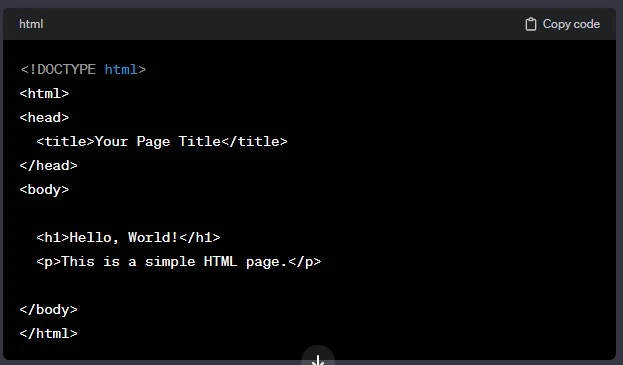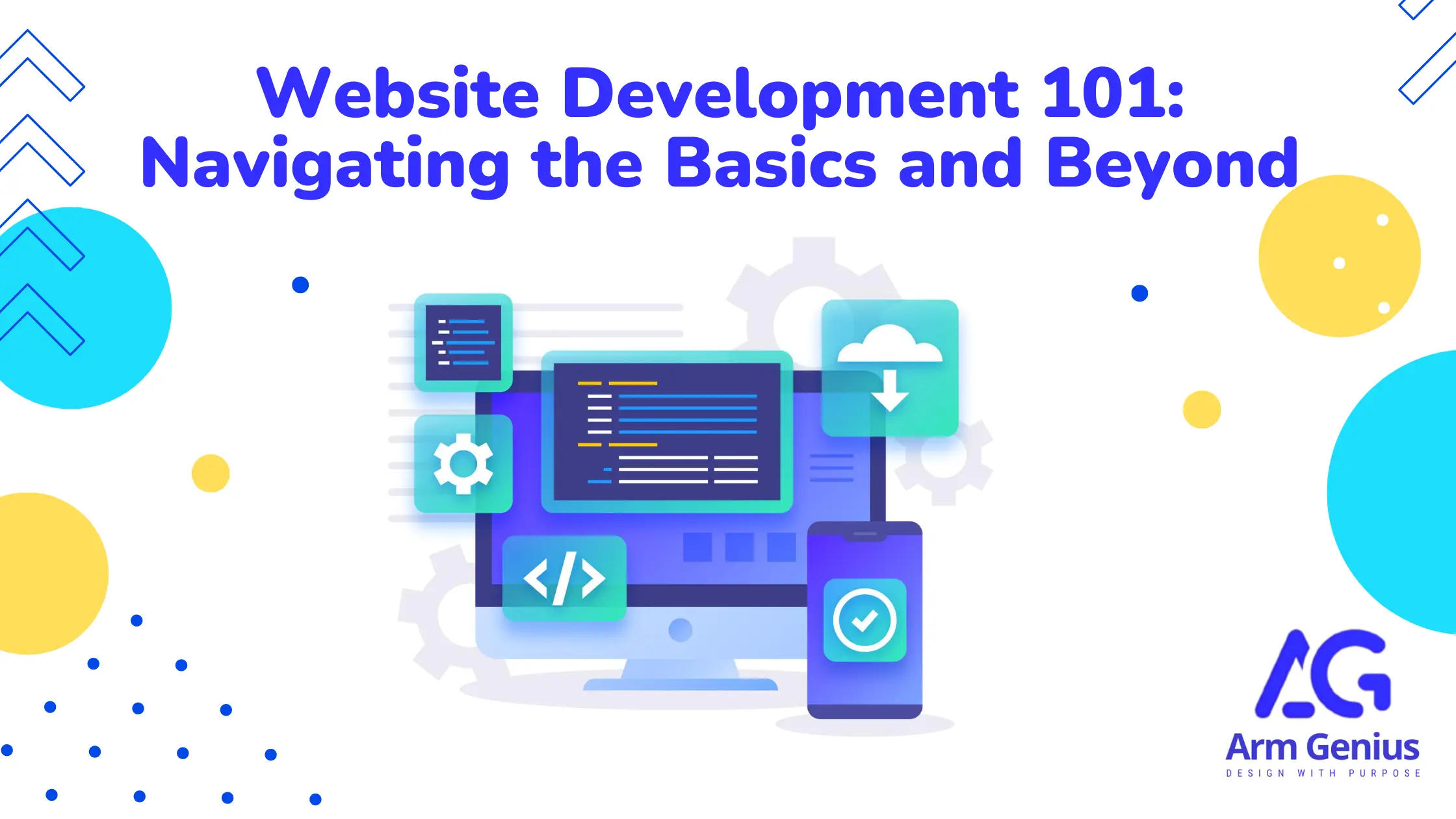Website Development 101: Navigating the Basics and Beyond
I've spent countless hours coding and playing with websites, and as a result, I now consider web development to be an art form and a means of realizing ideas. Website development includes all related development responsibilities, such as client-side and server-side scripting, server and network security settings, e-commerce development, and content management system (CMS) development, even though web development usually refers to web structure and code. So let's see how Ugandans can take part in this Race of Innovation. You can take your time to learn or simply hire a dedicated developer from India, because India has some pretty affordable, skilled, and dedicated developers.
What is Website development?
At its core, website development is the dynamic process of creating and building websites. It's a combination of design, coding, and demanding maintenance, all working harmoniously to ensure web pages operate without any issues across the broad Internet.
What is a Website?
Think of a website as a digital masterpiece—a collection of web pages and related content unified by a common domain name. Published on the same web servers, it calls users across the internet, offering a collection of information, multimedia, and interactive elements to explore.
Distinction between website programming, website design, and website development
.webp)
Website Development:
Website development is, in simple terms, the process of building a website that combines functionality and design. It requires careful coding, beautiful design, and constant attention to ensure that a website not only functions properly but also offers a satisfying user experience.
Website Design:
Website design rises to the level of user interface and beauty; a visually pleasing and user-friendly appearance is achieved by the integration of graphic design, page layout, and color palettes, while website development establishes the framework.
Web Programming:
Writing code and implementing functionality is the curses of website development for the developers working behind the scenes. Developers ensure a website is dynamic by adding interactive components, forms, and databases using languages like PHP or JavaScript.
What is an IP address?
An IP (Internet Protocol) address acts as a unique identification for every connected device in the massive Internet network. The digital fingerprint is what makes data transmission and reception between computers and servers possible, like artists working on a worldwide canvas.
What is Coding?
Coding is the language of digital creation—a process where lines of code, carefully written and organized, instruct a computer to perform specific tasks. It's the fundamental skill that empowers developers to communicate with computers and bring digital visions to life.
Accept the challenge of innovation and together, let's explore the ways in which Ugandans can contribute to the rapidly changing field of web development. Everyone can find a place in this creative adventure, which takes them from the center of code to the internet's canvas.
Website Development Companies in Uganda
There are a few notable companies in Uganda's web development scene that have impressive portfolios and social evidence. Take into consideration these five respectable companies, whether you're starting a new project or want to update your web presence:
Smart Choice UG
Smart Choice Ug is well-known for providing comprehensive and professional web development services. They have a history of excellent client reviews, which attests to their knowledge and dedication to providing high-quality solutions.
IGENO AGENCY
IGENO Agency is a dynamic force in creating unique websites, mobile applications, and digital marketing strategies. They have a solid reputation thanks to their emphasis on customizing solutions to promote the expansion of Internet businesses.
Maniflex:
Maniflex is a full-service business that provides a range of services, including web development, app development, logo design, and graphic design. Their goal is to enable companies to increase their internet presence by offering innovative and comprehensive solutions.
Arm Genius:
Arm Genius presents itself as a center for creativity and specializes in digital marketing, SEO, and website design and development. They focus on creating innovative and well-thought-out solutions to help their clients achieve success in the digital world.
Othware:
At Othware, scalability and innovation are top priorities. Their staff is skilled at building reliable websites and applications that are suited to the particular requirements of companies in a range of industries. For innovative digital solutions, Othware is the company to turn to because of its dedication to staying on the cutting edge.
In the ever-changing landscape of Ugandan website creation, these companies offer not only their technical expertise but also a track record of satisfied customers. Investigate your options with these prominent figures in the business as you set out on your digital adventure.
Here is my guide to choosing the right, not the best, website design company Make sure to read it; it will help you manage your costs and get the best companion.
Getting Started with Development
.webp)
Taking the step to establish a website opens opportunities to turn concepts into digital reality. We'll explore the essential building elements in this section, giving you the tools to get your development journey off to a great start.
What is HTML?
HTML, or HyperText Markup Language, is the backbone of web development. It defines the structure and layout of content on a webpage using a system of tags. Each tag serves a specific purpose, from headings to paragraphs and images, allowing developers to create a cohesive and organized structure.
Understanding HTML Tags:
HTML tags are the building blocks of a webpage. They encapsulate content elements and provide structure. For example, <h1> represents a top-level heading, <p> denotes a paragraph, and <img> embeds an image.

Styling with CSS
CSS, or Cascading Style Sheets, is the language used to style and format HTML content. It allows you to enhance the visual appeal of your webpage by controlling the layout, colors, and fonts.
Making a webpage visually appealing:
Experiment with different CSS properties to customize the appearance of your webpage. This includes adjusting colors, fonts, margins, and more.

For functionality: JavaScript
JavaScript adds interactivity and dynamic behavior to your website. It is a scripting language that runs in the browser, enabling you to respond to user actions and manipulate the content on the fly.
Basic JavaScript Functions:

Explore fundamental JavaScript functions that form the basis of interactive web development.
DOM Manipulation
Understanding the Document Object Model (DOM):
The DOM is a programming interface that represents the structure of a document as a tree of objects. JavaScript interacts with the DOM to dynamically update content and respond to user actions.
Manipulating Elements with JavaScript:
Learn how to use JavaScript to dynamically change content, modify styles, and handle user input by manipulating the DOM.
Getting started with these basics lays a solid foundation for your journey into web development. The combination of HTML, CSS, and JavaScript forms the core toolkit for crafting compelling and interactive web experiences.
We'll examine the differences between frontend and backend development in the following part, giving you a comprehensive understanding of the development environment.
Building and Hosting
.webp)
Now that you've covered the fundamentals of web development, it's time to investigate how to make your works accessible through the internet. This section will walk you through the steps involved in developing a website and cover important topics like selecting a domain name and hosting providers.
Website Development Process
The steps in the website building process help you from the initial idea to the ultimate launch. The common phases include planning, design, development, testing, deployment, and maintenance, yet there are some variances.
Steps Involved in Creating a Website:
- Planning: Define your goals, target audience, and content structure.
- Design: Create wireframes and visual designs for your website.
- Development: Implement the design using HTML, CSS, and JavaScript.
- Testing: Ensure the website functions correctly across different devices and browsers.
- Deployment: Make the website live for users to access.
- Maintenance: Regularly update content and address issues for optimal performance.
Choosing a Domain Name and Hosting Options
Tips for Selecting a Domain Name:
- Keep it short, memorable, and reflective of your brand or content.
- Avoid using hyphens and choose a name that's easy to spell.
- Registering a Domain:
- Select a domain registrar (e.g., GoDaddy, Hostinger) to register your chosen domain name. Follow their process to secure your unique online identity.
To delve deeper into the process of selecting the right website hosting company, be sure to explore our detailed guide in the article called: Top 5 best web hosting companies in Uganda
Overview of Hosting Services:
Web hosting is where your website's files and data are stored. Various hosting options include shared hosting, virtual private servers (VPS), dedicated servers, and cloud hosting.
Setting Up Hosting for Your Website:
Choose a hosting provider based on your needs and budget. Popular hosting services include Namecheap, GoDaddy, and Hostinger. Follow the provider's instructions to set up hosting for your website.
It gives you the ability to take your ideas from the drawing board to the internet by knowing the complexities of domain names, hosting choices, and website building. We'll look at the frameworks and technologies that speed up development and improve your skills as a web developer in the next sections
Making Development Easier
Personally I noticed that the more you learn about web programming, the more important efficiency becomes. We'll look at tools and frameworks in this area that are meant to improve your skills and speed up your development process. These tools will help you along the way, whether you're creating a dynamic online application or a personal blog
Popular Code Editors for Development:
Visual Studio Code (VSCode) is renowned for its versatility and extensive extensions, making it suitable for a wide range of programming languages. Personally, I recommend using VSCode due to its robust features and user-friendly interface. As it's the editor I use myself, I can attest to its many functionalities. To explore its capabilities, I encourage you to start experimenting with the various tools and extensions available.
Sublime Text: lightweight and fast, with a clean interface and powerful features.
Atom: Open-source and customizable, providing a collaborative and modern development environment.
Choosing the Right Code Editor:
Select a code editor based on your preferences and the languages you'll be working with. Most modern editors offer features like syntax highlighting, code completion, and version control integration.
Frameworks
Overview of Popular Frameworks:
Bootstrap: A front-end framework that simplifies the design process with pre-built components and responsive layouts.
React js: A JavaScript library for building user interfaces, developed and maintained by Facebook.
Angular: A robust front-end framework by Google, known for its modular architecture and data binding capabilities.
Understanding When to Use Frameworks:
Bootstrap: Ideal for quick development and maintaining a consistent design.
React: Suited for building interactive user interfaces, especially for single-page applications.
Angular: Recommended for large-scale applications with complex requirements.
By adding these frameworks and tools to your development process, you'll not only accelerate your work but also harness the power of the developer community as a whole. We'll go into testing and debugging strategies in the upcoming parts to make sure your products are error-free and efficient.
Security and Maintenance

In the ever-changing field of web development, security, and continuous upkeep are critical. You will have the information in this section to protect your works and make sure they survive. Let's examine the benefits of Content Management Systems (CMS) and the fundamentals of cybersecurity.
Cybersecurity
What is cybersecurity in the Context of Websites?
Cybersecurity involves implementing measures to protect your website from unauthorized access, data breaches, and malicious activities.
Importance of Securing Websites:
- Protecting User Data: Safeguarding sensitive information such as login credentials and personal details.
- Preventing Attacks: Defending against common threats like DDoS attacks and SQL injections.
- Building Trust: A secure website fosters trust among users and visitors.
Basic Cybersecurity Practices for Developers:
- Use HTTPS: Ensure the security of data transmission between the user and the server by using HTTPS, which is guaranteed through SSL (Secure Sockets Layer) certification. This encryption protocol adds an extra layer of protection, safeguarding sensitive information exchanged on your website.
- Regular Updates: Keep software, plugins, and frameworks up to date to patch vulnerabilities.
- Secure Authentication: Implement strong password policies and enable multi-factor authentication.
- Backup Data: Regularly back up your website data to mitigate data loss risks.
CMS (Content Management System)
What is a CMS?
A Content Management System is software that simplifies the process of creating, managing, and updating digital content on a website without requiring extensive technical knowledge.
Definition and Purpose:
- Simplify Content Creation: CMS allows users to add, edit, and organize content without delving into the intricacies of coding.
- User-Friendly Interface: Intuitive interfaces make it accessible for non-technical users.
- Collaborative Editing: Multiple users can collaborate on content creation and management.
Examples of Popular CMS Platforms:
- WordPress: Widely used for its flexibility, user-friendly interface, and extensive plugin ecosystem.
- Joomla: Known for its robustness and versatility, suitable for various types of websites.
- Drupal: Offers advanced customization options, making it ideal for complex projects.
You may build safe websites and manage them effectively by being aware of content management system advantages and cybersecurity best practices. We'll go over the main ideas and stress the importance of ongoing education in the always changing field of website development.
Well, here is our article that teaches people how to design their websites and host them for free, not even a single coin.
Conclusion
As you complete your crash course in website development, keep in mind that this is a constantly evolving sector that values inquiry and lifelong learning. You've established a strong foundation by grasping the fundamentals of HTML, CSS, and JavaScript as well as the nuances of domain names, hosting, and cybersecurity.
Remember to keep informed and involved in the active developer community as you start your web development career. Accept every coding obstacle as a chance to improve and hone your abilities.
And take into consideration Arm Genius if you're looking for a company with experience developing websites. Being an established and trustworthy Ugandan website-building business, they offer creativity and experience to make your digital dreams come true. Have fun with coding!





